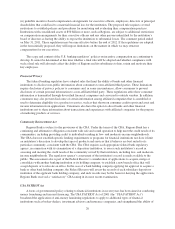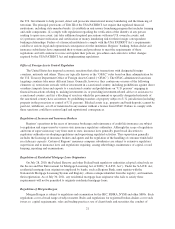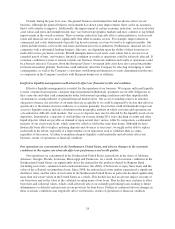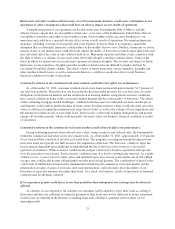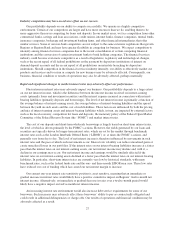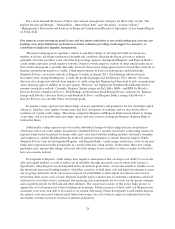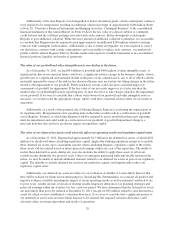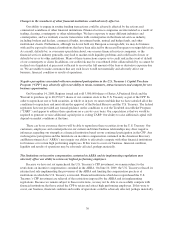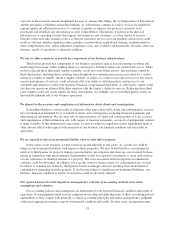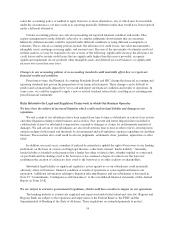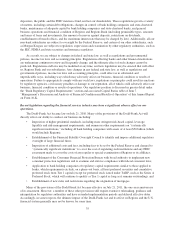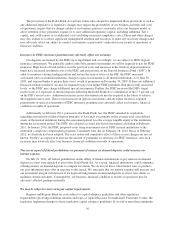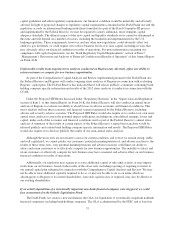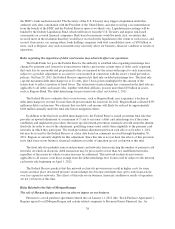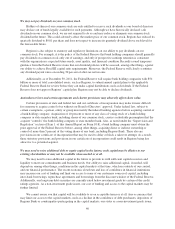Regions Bank 2011 Annual Report Download - page 54
Download and view the complete annual report
Please find page 54 of the 2011 Regions Bank annual report below. You can navigate through the pages in the report by either clicking on the pages listed below, or by using the keyword search tool below to find specific information within the annual report.Changes in the soundness of other financial institutions could adversely affect us.
Our ability to engage in routine funding transactions could be adversely affected by the actions and
commercial soundness of other financial institutions. Financial services companies are interrelated as a result of
trading, clearing, counterparty or other relationships. We have exposure to many different industries and
counterparties, and we routinely execute transactions with counterparties in the financial services industry,
including brokers and dealers, commercial banks, investment banks, mutual and hedge funds, and other
institutional clients. Furthermore, although we do not hold any European sovereign debt, we may do business
with and be exposed to financial institutions that have been affected by the recent European sovereign debt crisis.
As a result, defaults by, or even mere speculation about, one or more financial services companies, or the
financial services industry generally, may lead to market-wide liquidity problems and could lead to losses or
defaults by us or by other institutions. Many of these transactions expose us to credit risk in the event of default
of our counterparty or client. In addition, our credit risk may be exacerbated if the collateral held by us cannot be
realized or is liquidated at prices not sufficient to recover the full amount of the loan or derivative exposure due
us. We are unable to make assurances that any such losses would not materially and adversely affect our
business, financial condition or results of operations.
Negative perceptions associated with our continued participation in the U.S. Treasury’s Capital Purchase
Program (“CPP”) may adversely affect our ability to retain customers, attract investors and compete for new
business opportunities.
On November 14, 2008, Regions issued and sold 3,500,000 shares of Series A Preferred Stock and the
Warrant to purchase up to 48,253,677 shares of our common stock to the U.S. Treasury as part of the CPP. In
order to repurchase one or both securities, in whole or in part, we must establish that we have satisfied all of the
conditions to repurchase and must obtain the approval of the Federal Reserve and the U.S. Treasury. The federal
regulators have not provided any formal guidance on the conditions to exit the Troubled Asset Relief Program
(“TARP”) and appear to address these questions on a case-by-case basis. Our expectation is that we would be
required to generate or raise additional capital prior to exiting TARP. Our ability to raise additional capital will
depend on market conditions at the time.
There can be no assurance that we will be able to repurchase these securities from the U.S. Treasury. Our
customers, employees and counterparties in our current and future business relationships may draw negative
inferences regarding our strength as a financial institution based on our continued participation in the CPP. Any
such negative perceptions and the limitations on incentive compensation contained in the American Recovery
and Reinvestment Act (“ARRA”) may impair our ability to effectively compete with other financial institutions
for business or to retain high performing employees. If this were to occur our business, financial condition,
liquidity and results of operations may be adversely affected, perhaps materially.
The limitations on incentive compensation contained in ARRA and its implementing regulations may
adversely affect our ability to retain our highest performing employees.
Because we have not yet repurchased the U.S. Treasury’s CPP investment, we remain subject to the
restrictions on incentive compensation contained in the ARRA. On June 10, 2009, the U.S. Treasury released its
interim final rule implementing the provisions of the ARRA and limiting the compensation practices at
institutions in which the U.S. Treasury is invested. Financial institutions which have repurchased the U.S.
Treasury’s CPP investment are relieved of the restrictions imposed by the ARRA and its implementing
regulations. Because we remain subject to these restrictions, we may not be able to successfully compete with
financial institutions that have exited the CPP to retain and attract high performing employees. If this were to
occur, our business, financial condition and results of operations could be adversely affected, perhaps materially.
30


